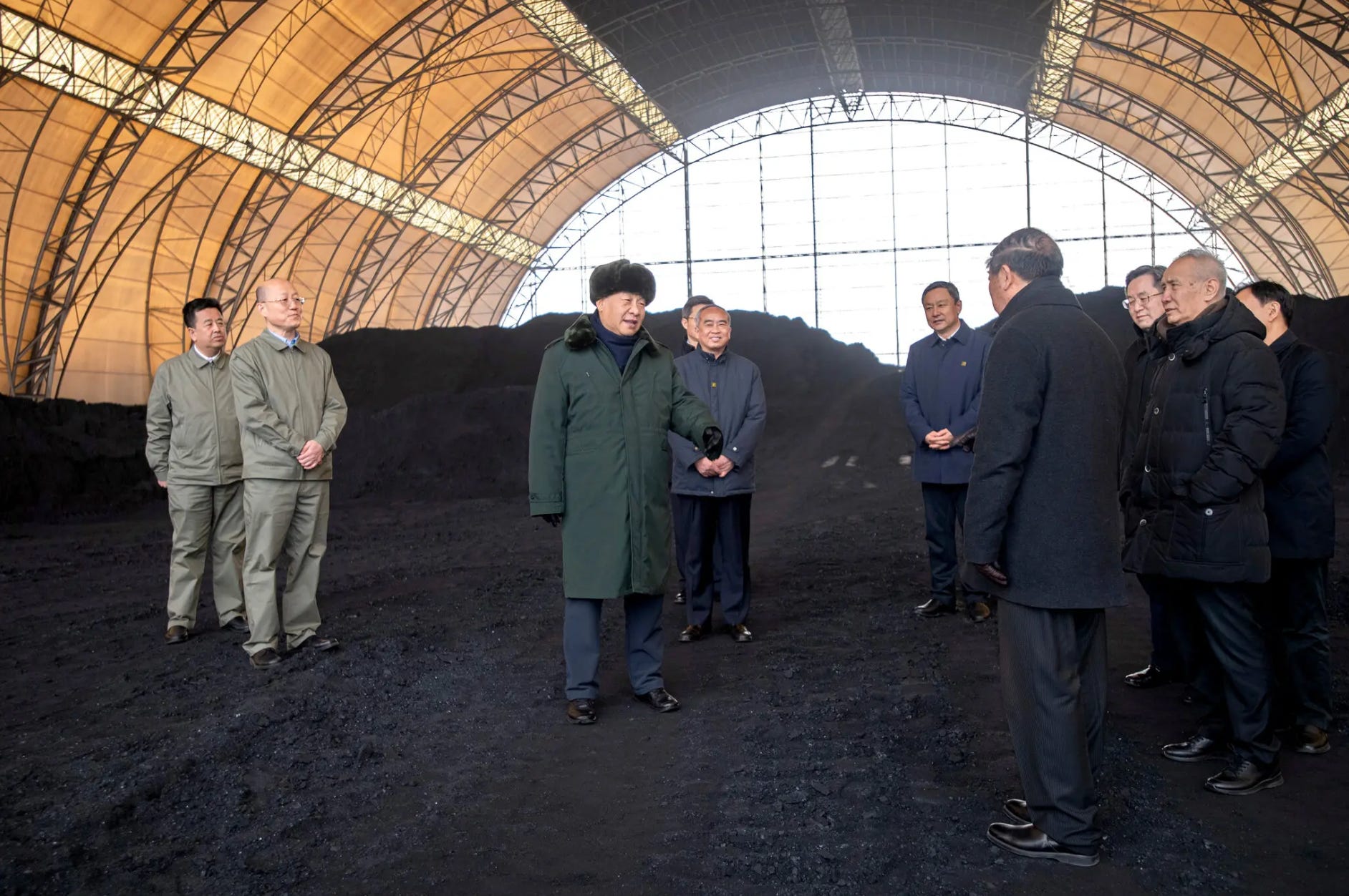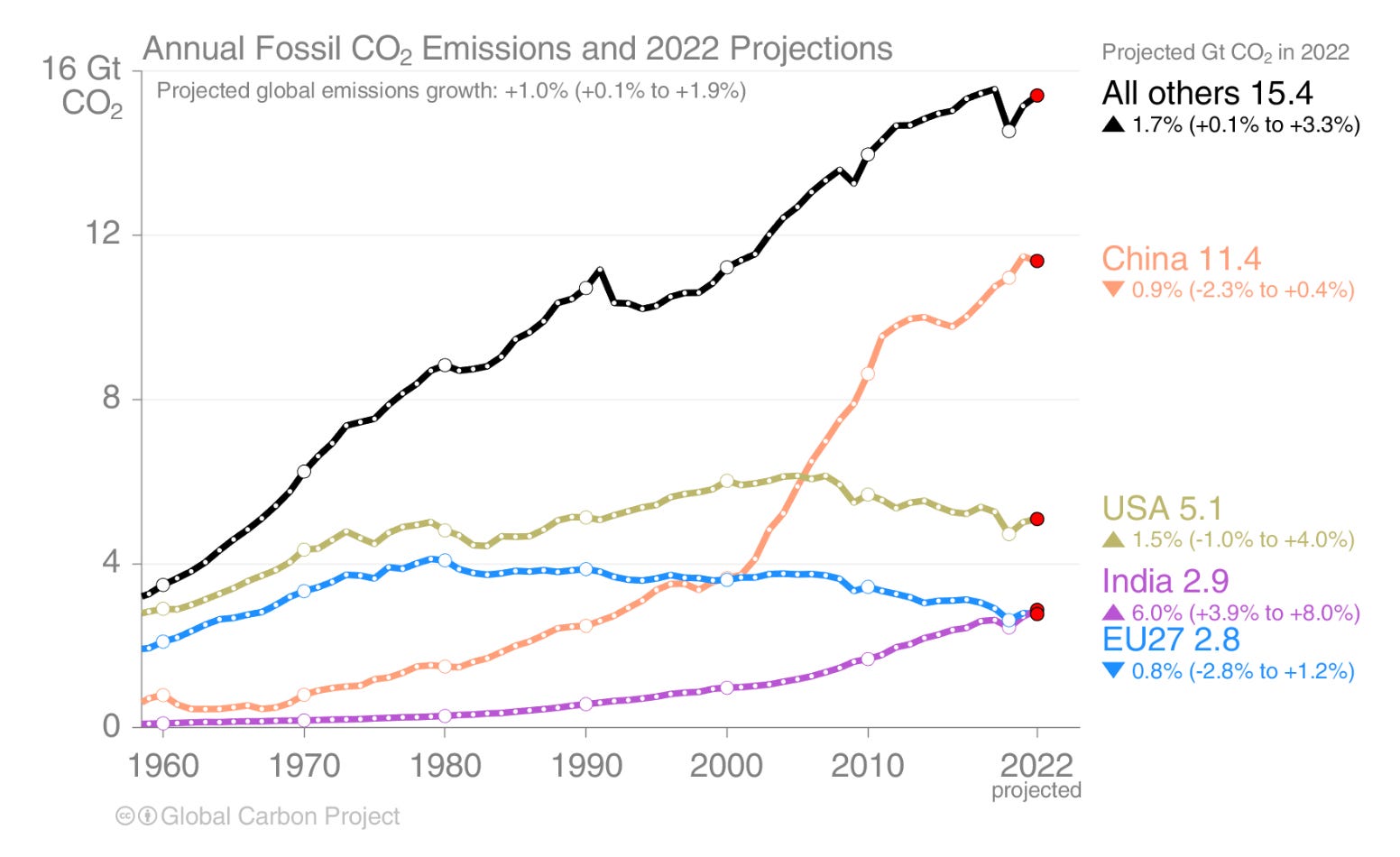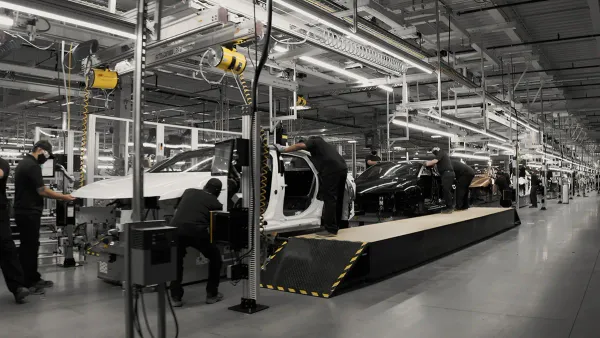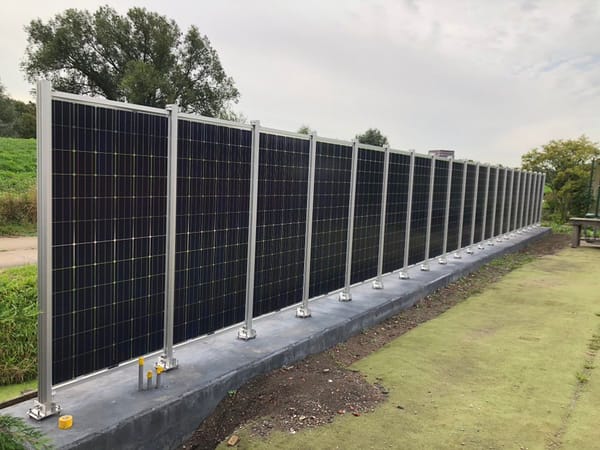Despite everything else, the U.S. and China are trying to agree on climate
Good Afternoon!
Just a reminder, I won’t be arriving in your email box Friday, since I’m taking a brief, but much needed trip to Mexico City with my wife. If you haven’t been to CDMX, go right away. It is more than you ever imagined. A truly global city that offers so much, you’ll never be able to see it all. I’ll be back to you on Monday.
-Mike

The climate stuff the U.S. and China are wrestling with
China is the world’s largest greenhouse gas emitter, putting out 31 percent of the world’s emissions. The U.S. is the second largest, putting out 14 percent. Up until the mid-2000’s the U.S. was the largest emitter but China since surpassed America and has continued to ratchet up emissions increases each year, according to the Global Carbon Project.
For those people concerned about climate change, it’s pretty obvious that if there’s going to be a significant reduction in carbon-dioxide and other emissions, the U.S. and China are going to have to take major steps. The graph below is a pretty strong illustration of who’s got the most work to do.

But, as it turns out, the United States and China haven’t been on the best of terms for a few decades. Even so, Sino-American climate discussions have typically followed this pattern:
U.S.: Hey, you guys should stop polluting so much. You need to cut back on all those coal plants.
China: Who are you guys to tell us what to do? You were the world’s biggest polluter for decades and used that time to build the world’s biggest economy! You just want to stop us from doing the same thing.
U.S.: But you should be green from the start. Give a hoot, don’t pollute!
China: You first.
[Scene]
This was how talks went for a couple decades. Then, something big happened, where the Biden Administration passed a whole bunch of climate-forward policies and jump started the country’s green economy with the Inflation Reduction Act. Last week Climate Envoy John Kerry went to prod China with our new green stick as both the U.S. and China were experiencing record heat waves.
U.S.: Hey, we’re getting green now. And it’s totally hot. So you should too.
China: We’re already producing more solar and wind tech than the rest of the world combined. Cool to see you catching up.
U.S.: Yeah, but you’re still the biggest carbon emitter. When are you going to stop that?
China: When we want to. But we’re still going to whip your butts on green stuff.
[Scene]
You see the problem? Even while Kerry was visiting with China’s climate envoy, Chinese leader Xi Jinping issued a statement that, “the pathway and means for reaching this goal [for climate], and the tempo and intensity, should be and must be determined by ourselves, and never under the sway of others.” And to send a message on his green bonafides, last winter he issued a photo of him (see top of post) standing on top of a big pile of coal, congratulating the locals on their plans to burn it.
Even as China is the biggest solar and wind energy producer, it is furiously building new coal plants. From their perspective, growing their economy to lift every Chinese out of poverty and into a middle class lifestyle is job number one – fixing climate change is maybe number two.
And how can we Americans be upset with that? After all, while we’re spending hundreds of billions on green tech, it’s not like we’re upending our country to fix climate. Like we spend $64 billion a year on highway construction, while Amtrak’s budget is $2.4 billion a year.
Still, there’s been some progress, like at COP26 in 2021 the U.S. and China agreed on a methane emissions measurement program. This is important, since China is the world’s biggest agricultural methane emitter since it has extensive rice fields and lots of cattle, while the U.S. also has huge cattle herds (which have lots of “enteric fermentation”, I dare you to look that up) and methane emissions from landfills.
Being an economy under central control, China has usually hit the national climate goals it has set under global negotiations, something the United States has not really done in the past. This year’s climate negotiations meeting in December, COP28 in Dubai, will include the first Global Stocktake report, an official U.N.-managed measurement of each country’s efforts to meet national climate mitigation goals. A betting man would expect China to hit their goals while the U.S. probably won’t. Under those circumstances, why would China agree with the U.S. to do more?
Besides agreements to cut methane and carbon emissions, the U.S. would like China to commit to assisting with three major issues: Access to processed lithium for which China dominates the world’s supply, shedding its out of date “developing nation” status when it comes to funding the global green energy transition, and syncing up with Europe and the U.S. to seek a 1.5-degree Celsius warming target rather than a 2-degree target.
For its part, China wants the U.S. to eliminate solar tariffs and new limits on batteries produced outside the U.S. Both of which hurt China’s export-oriented economy.
At the start, Kerry claimed that hhe went to China empty handed. “I’m not going over with any concessions. What we’re trying to do is find ways we can cooperate to actually address the [climate] crisis,” he told the Financial Times.
But then, after two full days of closed-door talks that went into the night, Kerry met with China’s Vice President Han Zheng for dinner, a subtle but important signal that Chinese leadership thinks the meetings are important. Perhaps we might see some kind of major announcement when the U.S. and China arrive in Dubai for COP28 this December. One can only hope.
Other Things Happened
- Surprise! Many House Republicans don’t think the recent heat waves and Canadian fires are connected to climate change.
- Ford is cutting its starting price for the EV F-150 by $10k to $50,000, likely kicking off an EV price war. Meanwhile, GM’s EV Blazer is shipping at a starting price of $44,600.
- The first commercial scale geothermal power plant is operating in Nevada, connected to the grid and generating 3.5 megawatts.
- A report issued yesterday by the G20 nations and co-authored by former U.S. Treasury Secretary Larry Summers says nations will need to spend at least $1.8 trillion a year to curb climate change. This is the first statement by developed countries affirming the necessity of large scale spending.
And here is your bottom of the newsletter prize: My favorite WGA strike tweet thread.





